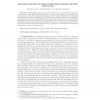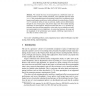1234 search results - page 205 / 247 » Organizational Abstractions for Adaptive Systems |
PODC
1991
ACM
14 years 1 months ago
1991
ACM
Abstract. Self-stabilizing message driven protocols are deļ¬ned and discussed. The class weakexclusion that contains many natural tasks such as -exclusion and token-passing is deļ...
ECTEL
2007
Springer
13 years 11 months ago
2007
Springer
Abstract. E-Learning grows on the fertile soil of the Internet technologies; it fails, however, to reach their full potential. With new, emerging technologies of the second generat...
BIS
2008
13 years 11 months ago
2008
Abstract. Web 2.0, also known as the Social Web, marks a new philosophy where users are both the main actors and the content producers: users write blogs and comments, they tag, li...
OPODIS
2004
13 years 11 months ago
2004
Abstract. We consider the issue of task assignment in a distributed system under heavy-tailed (ie. highly variable) workloads. A new adaptable approach called TAPTF (Task Assignmen...
GECCO
2010
Springer
13 years 9 months ago
2010
Springer
To complement standard fitness functions, we propose "Fitness Importance" (FI) as a novel meta-heuristic for online learning systems. We define FI and show how it can be...


